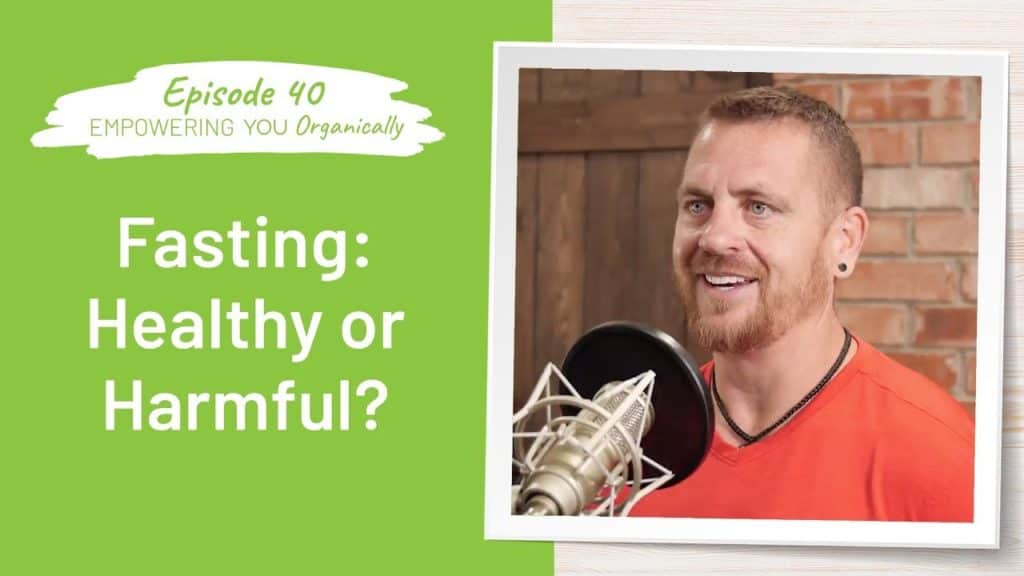Empowering you Organically – Season 6 – Episode 40
Title: Fasting: Healthy or Harmful?
Hosts: Jonathan Hunsaker & TeriAnn Trevenen
Guest: N/A
Description: What is fasting? Is it harmful? Does it really improve your health? Tune in this week as we explain the types of fasting, the common misconceptions around fasting, and things to look out for when entering into a fast.
Fasting
The willing abstinence or reduction from some or all food, drink, or broth for a period of time.
Absolute Fasting (Dry Fasting)
Abstinence from all food and liquid for a defined period.
Apophagy
Your body processing the weaker cells, the damaged cells in your body for fuel
Insulin response is important. Eating multiple times a day causes your body to be constantly releasing insulin. Therefore, it cannot go into apophagy.
Fasting is mental. Your body may be telling you it needs food, but you may just be dehydrated. It typically becomes easier after day three.
Ketones
The more ketones that are in your bloodstream, the more ketones get into your brain, the more alert you get and the less distracted you are.
Caloric Restriction
A person’s daily caloric intake is reduced by 20-40 percent.
Benefits of Fasting
Weight loss
Types of Fasting
- Juice Fast
- Intermittent Fasting (Time-Restricted Eating)- You only eat for a certain period of time during the day.
- You do not need to eat ketogenic to do intermittent fasting.
- Water Fasting
- A type of fasting in which you consume only water for a set period of time.
- Long-period water fasting may not be as beneficial for women.
- There have been studies where the efficacy starts dropping off after day five.
- Breaking a water fast – just eat like a light snack, and then eat a meal later.
- It’s been said that if you’re doing a long, extended water fast, like they actually say to rest a lot and get really hydrated.
- Your inflammation levels go way down, so you’re not holding as much water.
Intermittent Fasting Patterns
- 5/2
- Eat 5 days a week, restrict calorie intake for 2 days.
- Under 500 calories for women, 600 calories for men.
- Fill those calories with healthy fats.
- Mimicking diet
- Under 800 calories day one, under 400 calories next 4 days.
- 6/1
- Eat 6 days a week, restrict calorie intake for 1 day.
- Eat/Stop/Eat
- 24-hour complete fast, one to two times per week.
- Daily
- 16/8 – most common pattern – fasting for 16 hours and eating for 8.
- 18/6 – fasting for 18 hours and eating for 6.
- 20/4 – fasting for 20 hours, eating for 4.
Things to Look Out For
- Know what works for you and your body! Know what your body responds to. Make sure you are being monitored by a medical professional.
- Hunger pains – drink some water and wait for 15 minutes.
- Individuals with the following conditions should abstain from intermittent fasting.
- Diabetes
- Eating disorders
- Use of medications that require food intake
- Individuals in active growth stages, such as adolescence
- Pregnancy and breastfeeding
- Dehydration
- “Keto Flu” Your body’s not holding onto water weight the way that it did. When it’s releasing all of this water weight, it’s no longer able to hold onto the electrolytes that it needs as well. Make sure you’re getting electrolytes!
- Headache – get electrolytes.
- Make sure to get plenty of sleep!
A Common Misconception About Fasting
Your body is going to start burning muscle for fuel, and that you’re going to lose a lot of muscle as you get into doing fasting, water fasts. It’s simply not true. Your body can actually burn fat much easier, and your body’s going to go into ketosis and burn fat. And even if you were to lose a little bit of muscle mass, what actually happens is your body releases a lot more human growth hormone while you’re doing a water fast, and especially coming out of that fast.
Ways to Get Electrolytes
- Potassium supplement
- Magnesium supplement
- Pink Himalayan salt in water
* * *
Subscribe to Empowering You Organically
Never miss an episode!
APPLE PODCASTS SPOTIFY GOOGLE PODCASTS
–
Episode 40 – Fasting: Healthy or Harmful?




